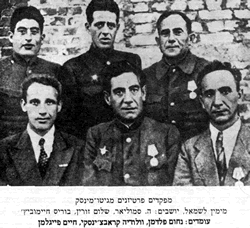Shalom Zorin
Shalom is sitting in the middle
http://www1.yadvashem.org/odot_pdf/Microsoft%20Word%20-%206397.pdf
(1902--1974), Jewish Partisan commander in Minsk.
The Germans invaded Minsk in late June 1941 and transferred the city's
Jews, Zorin included, to a ghetto. Zorin worked in a local Prisoner of War
camp, where he met a captured Soviet officer named Semyon Ganzenko. In
late 1941 Zorin and Ganzenko escaped to the forests in the Staroe Selo
region, about 19 miles southwest of Minsk. While hiding in the forest, the two
established a partisan unit called Parkhomenko. The unit consisted of 150
members, including many Jews.
As more and more Jews joined Parkhomenko, many conflicts arose
between the Jewish and non-Jewish fighters. Zorin defended his fellow Jews,
leading Ganzenko to recommend that he establish a new Jewish partisan unit
to take in Jews who had escaped the ghetto, called "Unit 106" (later the unit
was referred to as the "Zorin Unit"). The Zorin Unit began with 60 men and 15
guns, but over time, it grew to 800 people. After the Zorin Unit was attacked
by the Belorussian police and the Nazis situated in the Staroe Selo area, it
moved its headquarters to the Naliboki Forest. The unit stayed in contact with
the Minsk Ghetto through teenage boys who helped Jews who had escaped
the ghetto reach the forest.
The Zorin Unit also had a camp for Jewish artisans who set up workshops in
the forest, and thus served partisan units all over the area (see also family
camps in the forests). There was a sewing workshop, a shoemaker's
workshop, a flourmill, a bakery, a sausage factory, a weapons repair and
bomb production shop, and a big hospital with doctors from Minsk. They also
created a school that served 70 students. The camp members celebrated both
Soviet and Jewish holidays. Zorin had about 100 fighters in his combat unit
whom he treated with fatherly care. He believed that saving Jewish lives was
his most important goal.
In July 1944 Zorin was wounded in his leg during a battle with a retreating
German unit; seven of his men were killed. In 1971, about 25 years after the end of the
war, Zorin immigrated to Israel
